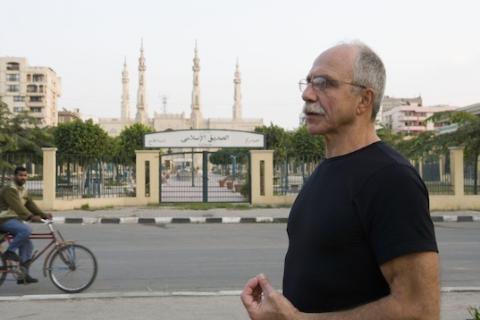
Fr. Doug May, MM, who has spent almost 20 of the last 31 years in Egypt, is currently the only U.S.-born Catholic priest there. The following reflection is his personal opinion on recent events.
Anyone who knows me knows that I am addicted to Egypt in much the same way that I am addicted to smoking. Both are not good for my health, but I can’t live without them. While serving the English-speaking Catholic community in Cairo, most of my time and effort has been spent living and working with Egyptians.
I am not an expert, a politician, a businessman nor a journalist. I am known for not being politically correct or being a romantic about Egypt or U.S. foreign policy in the Middle East, especially when it comes to Egypt. I express my opinion not as the truth, but as one opinion among many hoping to make readers think critically whether they agree or not.
Over the last 10 years, I have flip-flopped between claiming that democracy was of little importance to the average Arab and Egyptian to being caught up in the spirit of the Arab Awakening. Any opinion is based on one’s perspective of incidents as seen and reflected on.
In January 2011, the Egyptian Revolution BEGAN and it continues 30 months later. U.S. Americans and others tend to sterilize and sanitize their own histories only to act “holier than thou” when non-western countries pass through similar stages of nation building. Egyptians lived with military dictatorship for 60 years and have never democratically elected a leader. Elections since coming first to Egypt were voting for two choices: Mubarak – Yes; Mubarak – No.
Whatever formation and education occurred in most homes and schools over the last decades have focused on content with little methodology, critical thinking or strategic planning. Strategic planning and organizational skills are not strong suits in Egypt. If one witnesses the driving, noise, litter, mutilation of building facades, etc., one concludes that Egyptians have difficulty seeing beyond their own immediate world and beyond the “day” in which they live. While Egyptians wanted Hosni Mubarak out without his son Gamal taking over, they had little idea what they wanted to replace their “father/dictator.”
In the background as I write this article, I am channel surfing various news foreign networks. The debate in the West seems to be whether “it” was a coup or a popular uprising. Was a democratically elected president deposed by the military or the people? I guess the best response is “both the above.” Mohamed Morsi and the Muslim Brotherhood, more than being inept, were transforming what was a very secular country back in the 1950s and 1960s into an Islamic society where minorities, especially Christians, were tolerated at best. The words “democracy” and “democratic” are being tossed around and debated as if we were debating the divinity of Jesus. But while democracy may be thought of as the best way to govern in the west, democratic governments have often become dysfunctional to the degree that our leaders focus on political self interest and disconnect from their citizens.
Democracy is an evolutionary process of trial and error occurring in history. There is not a European country or the United States that has not experienced violent civil and/or religious wars. The double standard of the U.S. and Europe who supported the military dictatorships of Anwar Sadat and Mubarak due to Egypt’s peace with Israel exhibits hypocrisy. A congressional aide told me 20 years ago that the White House and the Congress never reviewed the human rights issues of Egypt or Israel when making their annual allotments of U.S. aid to both countries. Oppression in Egypt and occupation of Palestine were seldom even discussed. The U.S. has always supported the military in Egypt and the regime it protected. U.S. Americans have painted themselves into a corner in supporting “democracy” after having supported dictatorship without realizing the consequences. Similar to the Oslo Accords undercutting the growing popularity of Hamas only to have George W. Bush shun Yasser Arafat – guaranteeing the democratic election of Hamas – so U.S. policy painted itself into another corner in supporting a popular uprising in Egypt without realizing that the Muslim Brotherhood was the only organized political group that would win and then follow an undemocratic “policy of exclusion” of minorities.
To my knowledge, the new constitution has no method of political recall so the 20 million plus signatures taken by the “Tamarud/Rebel” movement became a popular recall that the military facilitated. While the military surely had self interest in doing this, they enacted the WILL of a majority of the Egyptian people. While the Egyptian military is elitist, it also has an intimate relationship with the Egyptian people. If the Supreme Council of the Armed Forces (SCAF) had encouraged the formation and organization of political parties instead of exploiting the political chaos and delaying elections, chances are that Morsi and the Muslim Brotherhood would not have been elected to leadership.
After the last 30 months of political, economic and social chaos, it will take a lot time, effort and money to begin to rebuild Egypt into a pluralistic, civil society. Turning back the clock to the “good old days” of the 1950s and 1960s is not possible, but remembering the Egypt of that period may help in forming and educating Egyptians to recreate their country into a socially conscious, organized and inclusive society.
One day, democracy may become a reality in Egypt. Right now, most Egyptians just want to get on with their lives without Morsi and the Muslim Brotherhood running the show while still giving them a role in government. Right now, Egypt does not have the luxury of democracy. Right now, law and order need to be restored along with economic and political stability.
Read further analysis of the situation in Egypt at the Arab West Report website.
